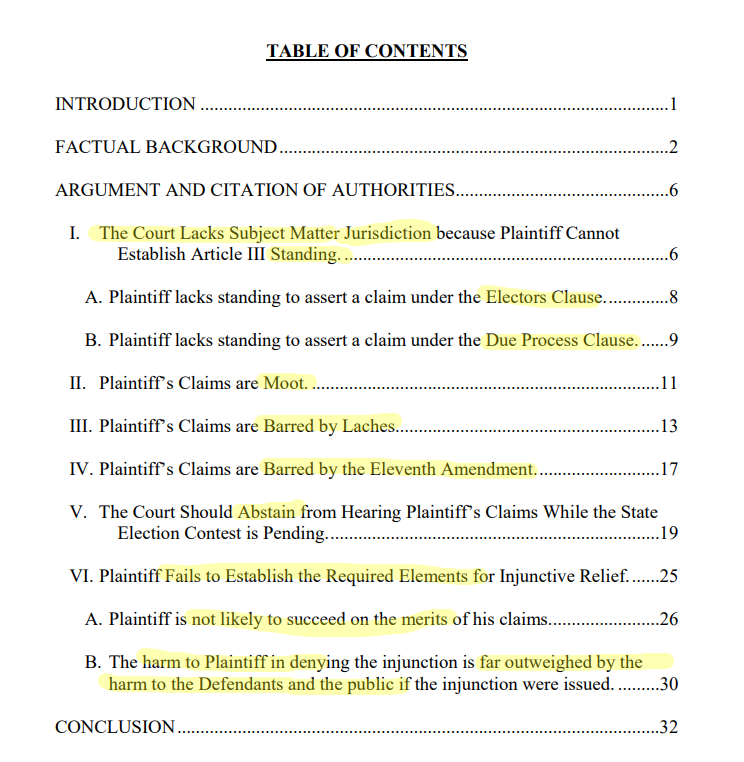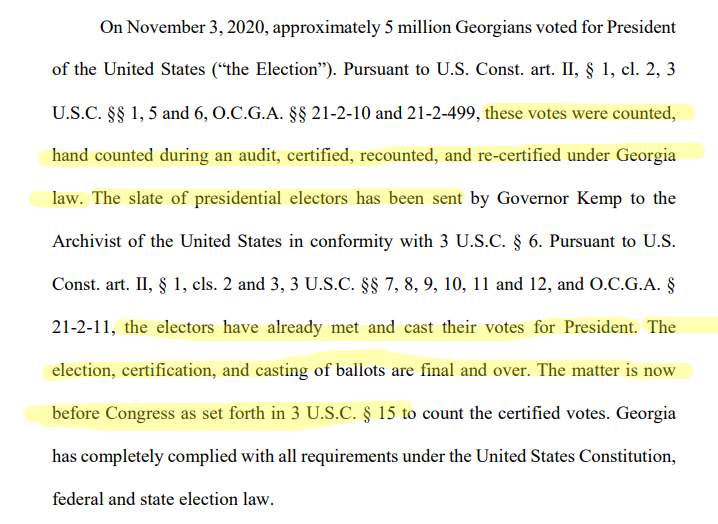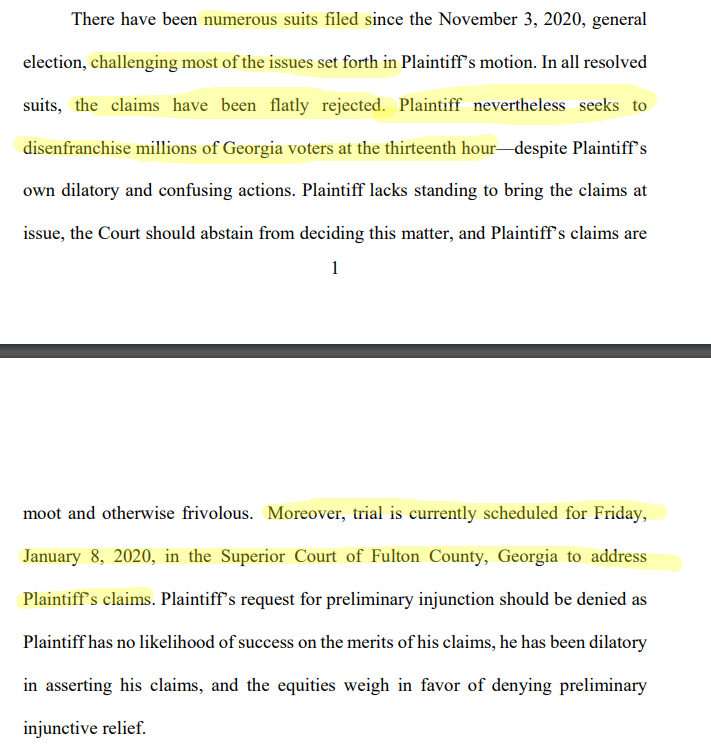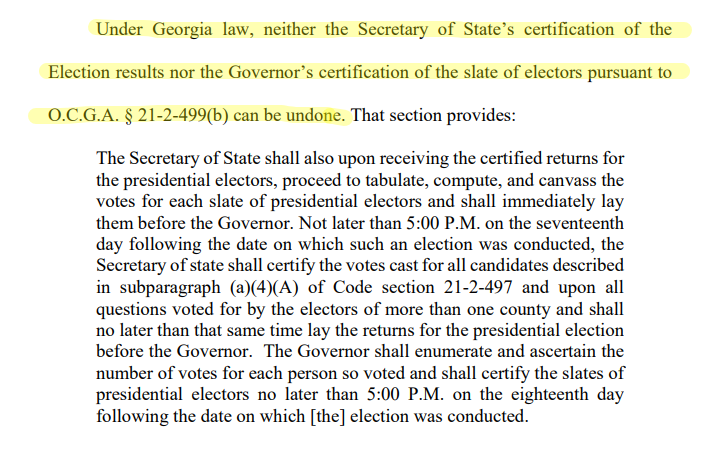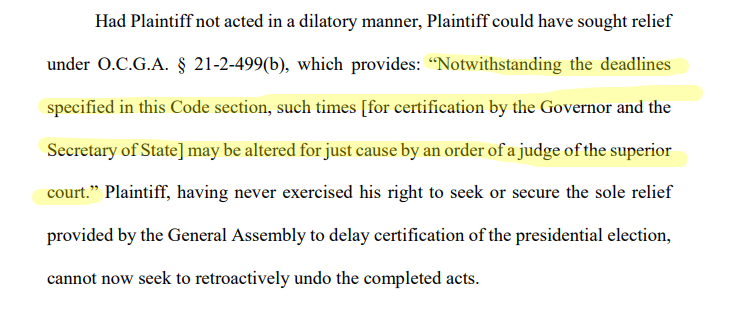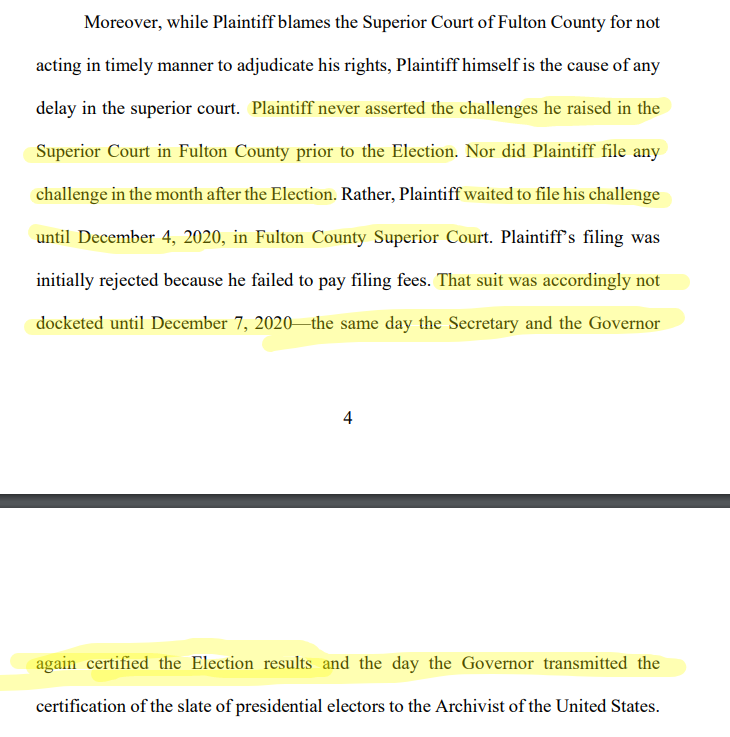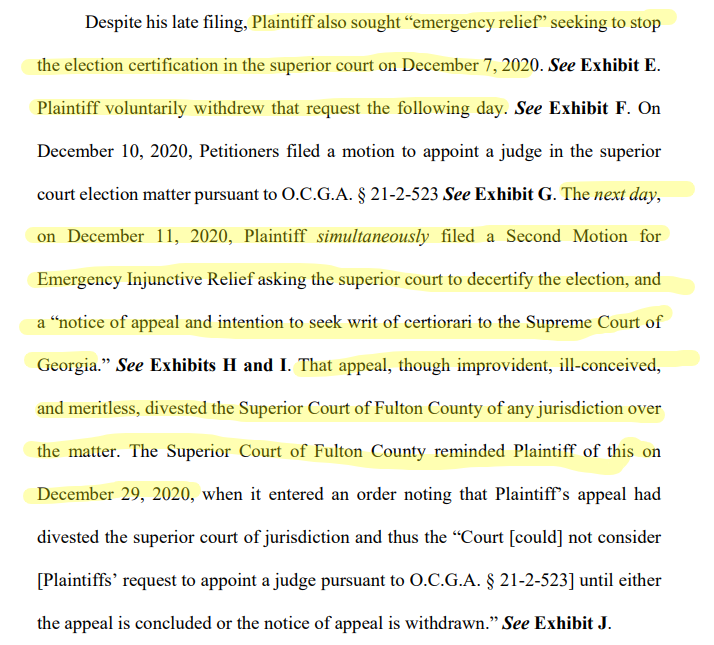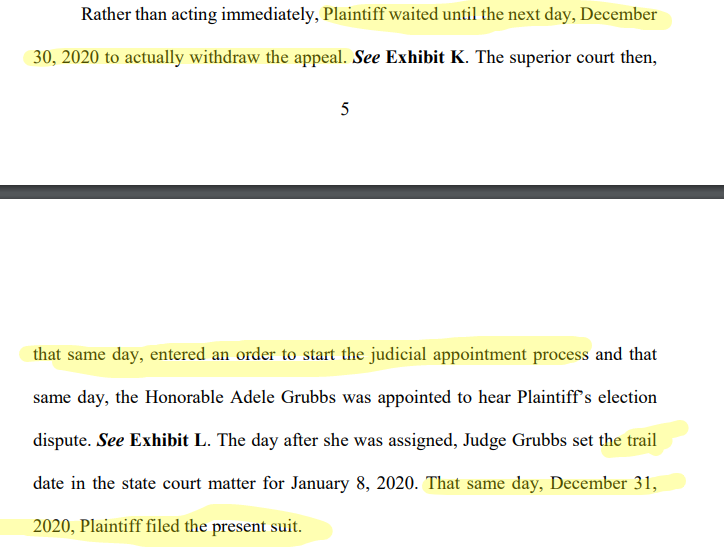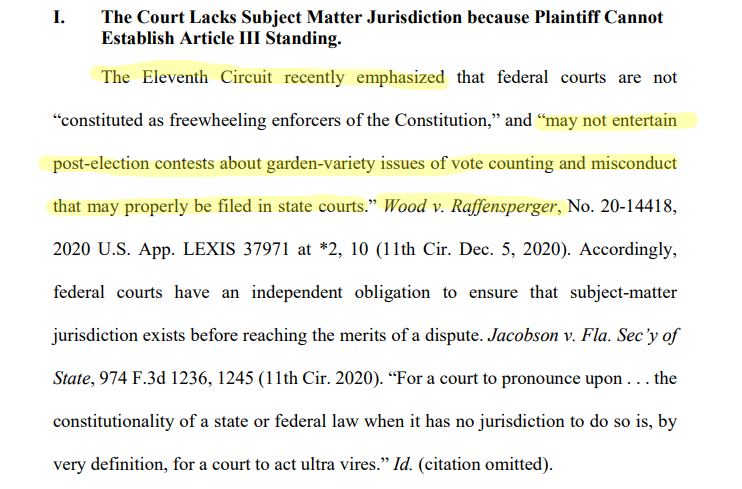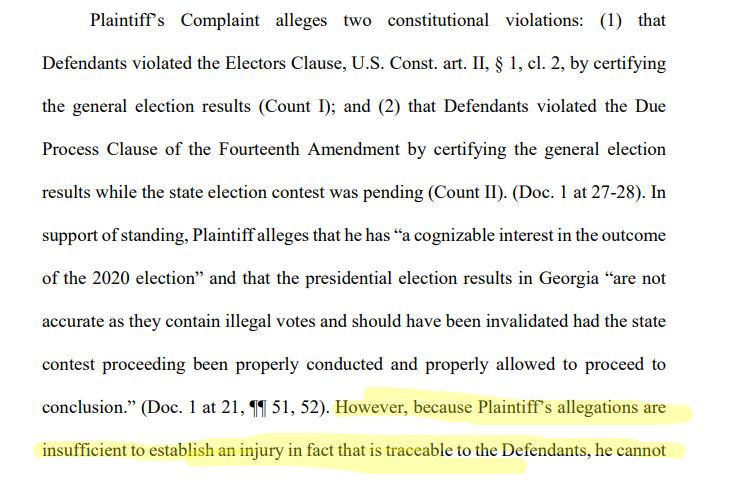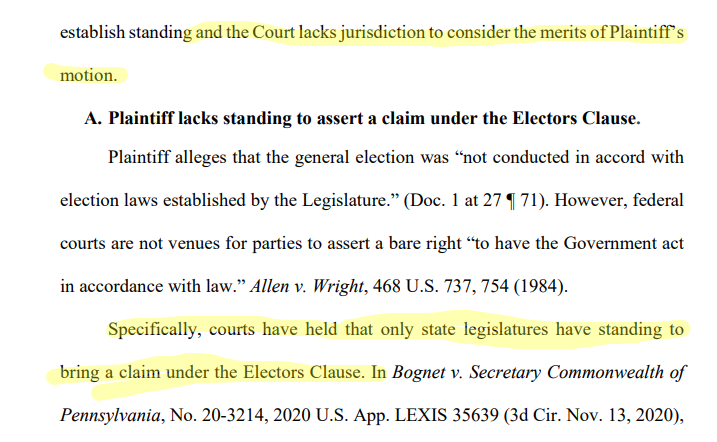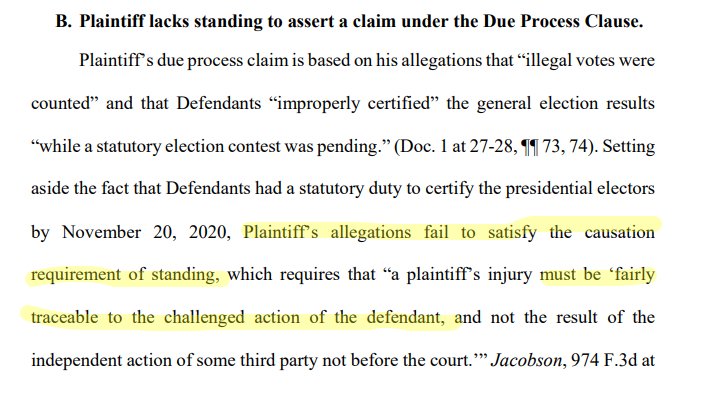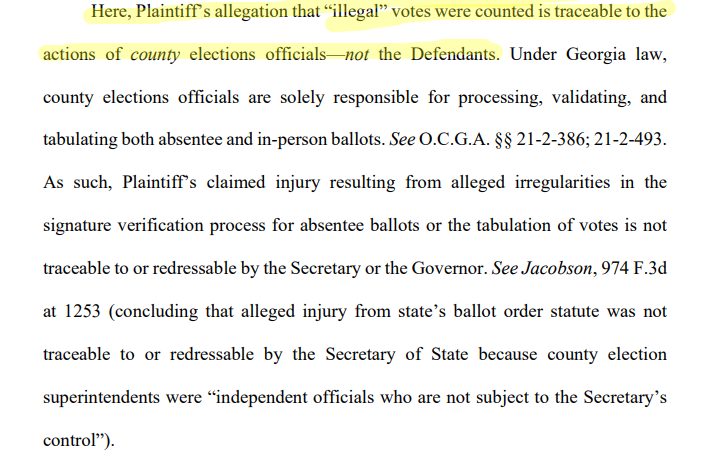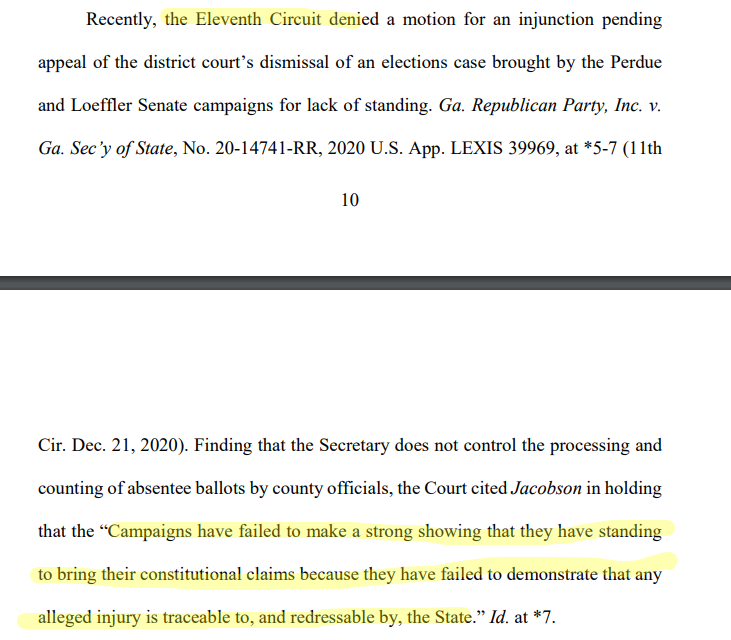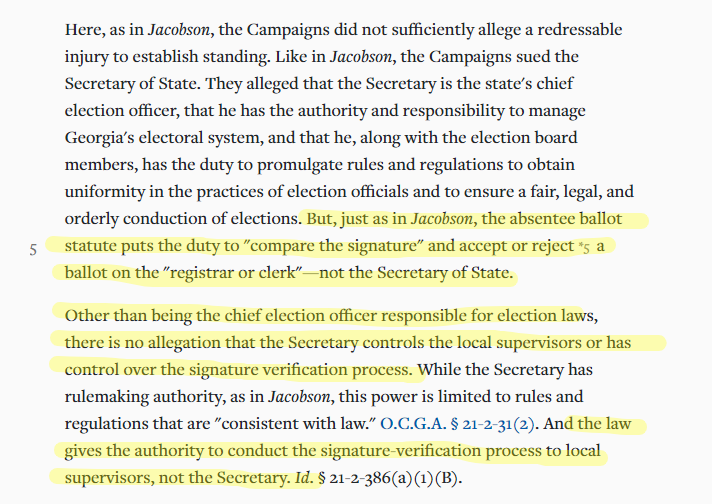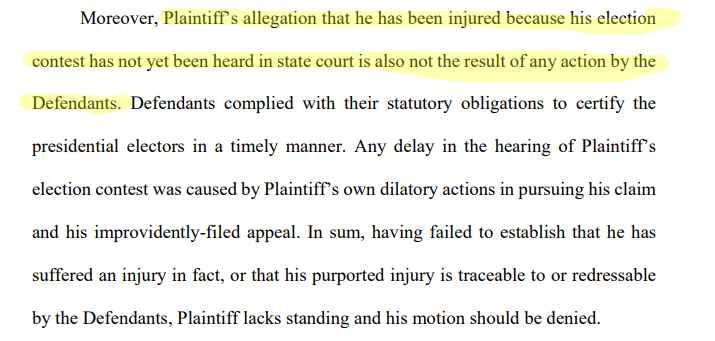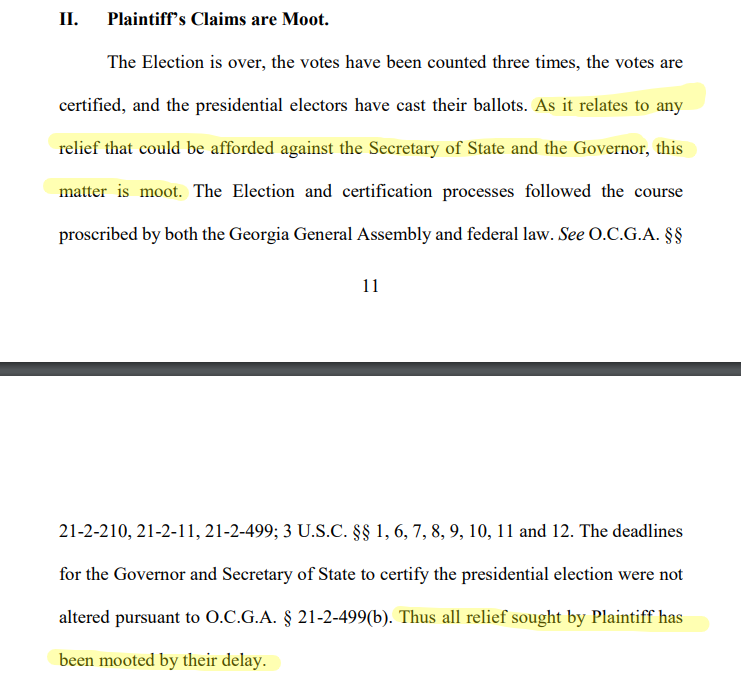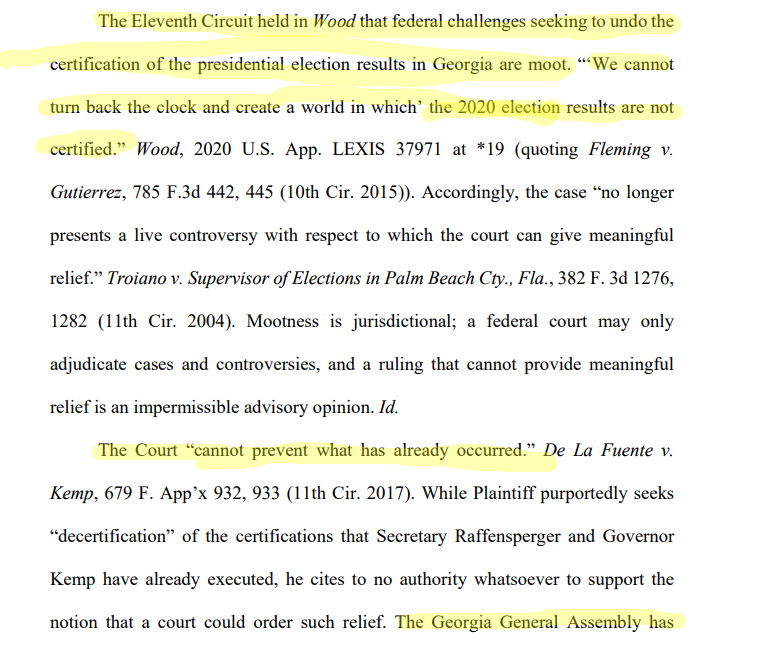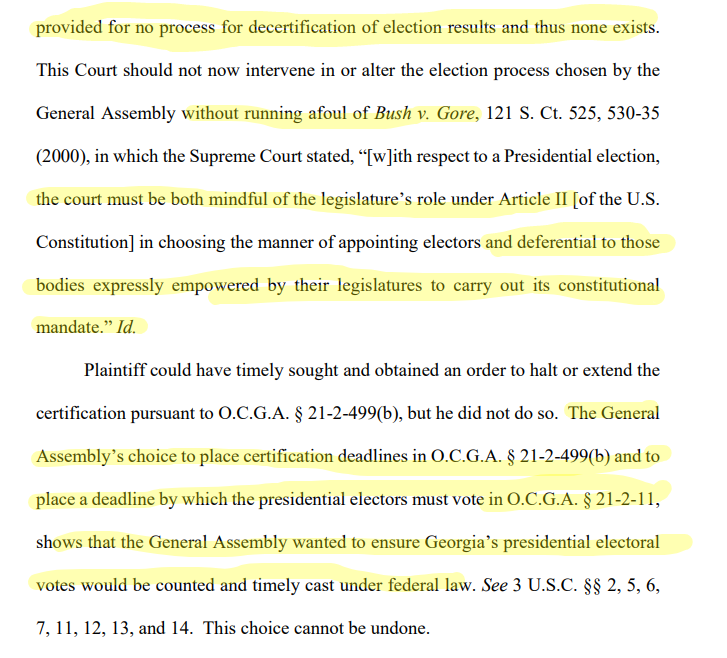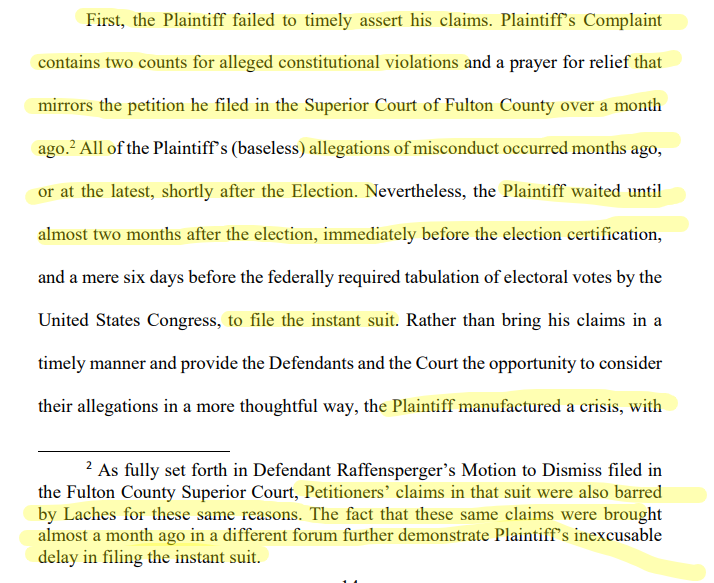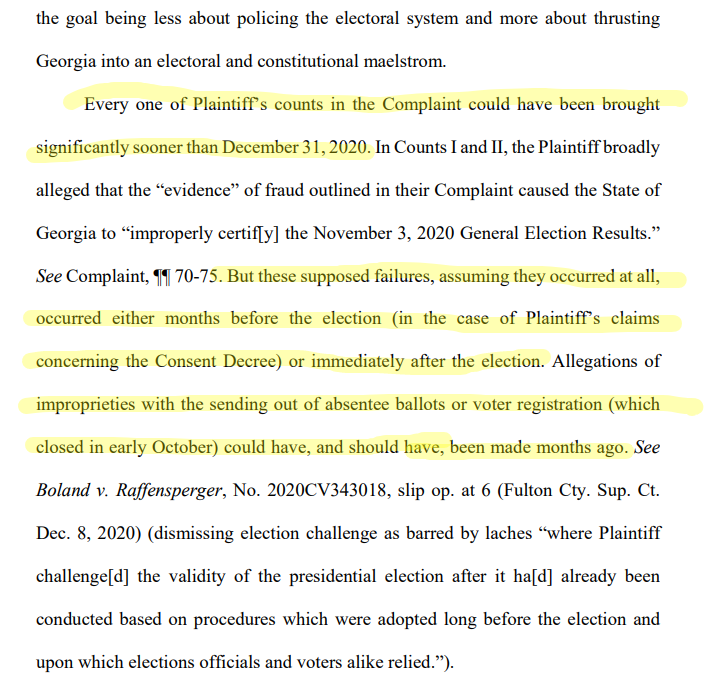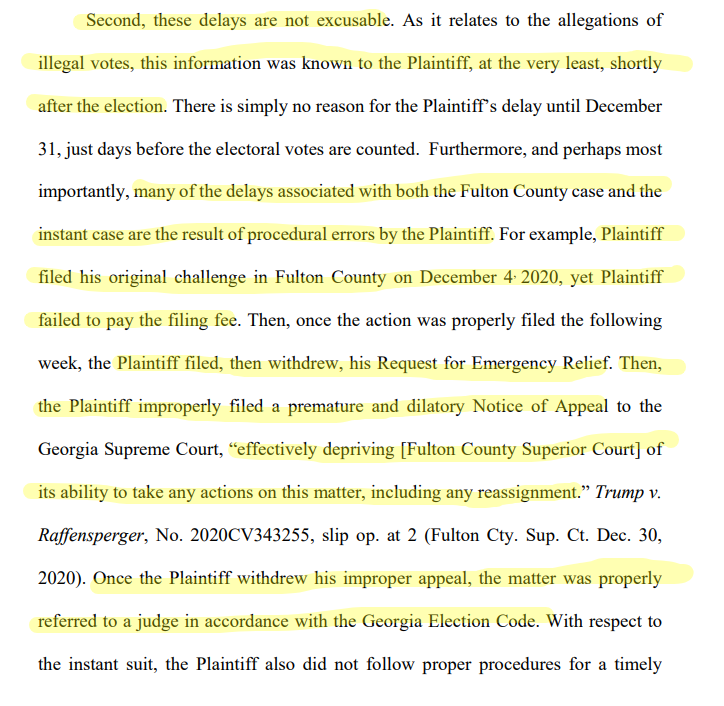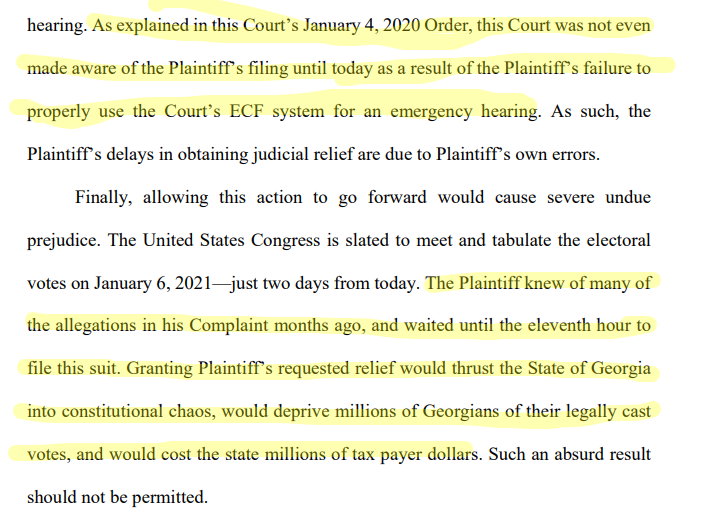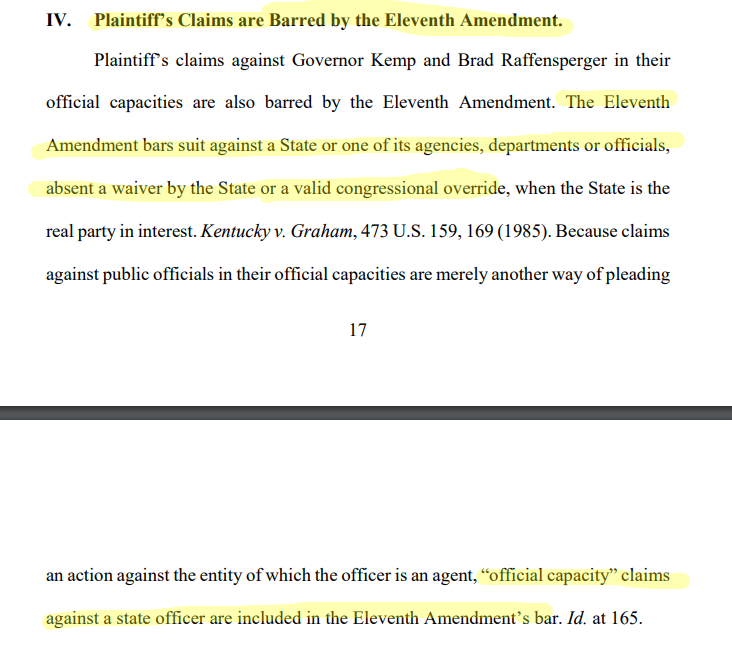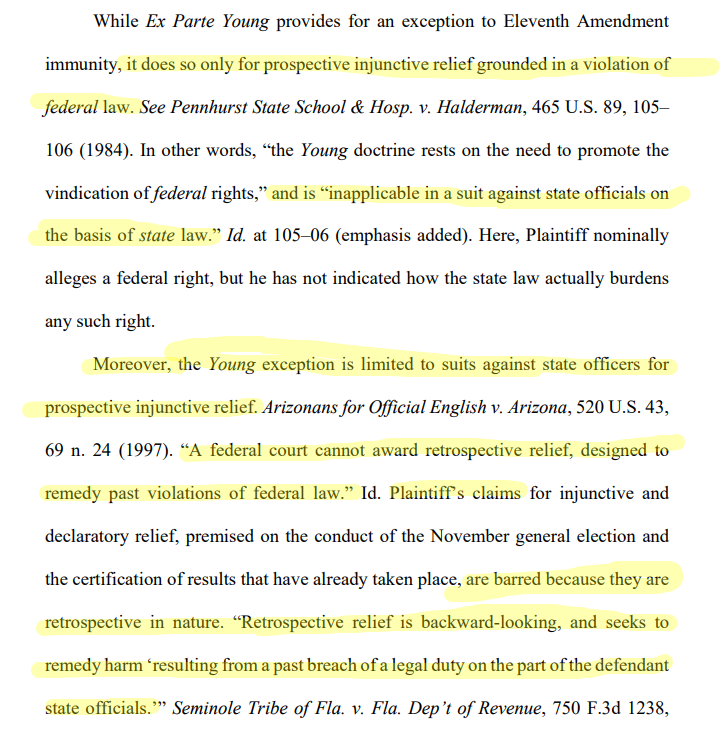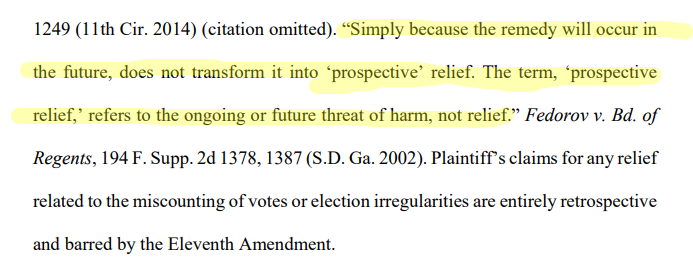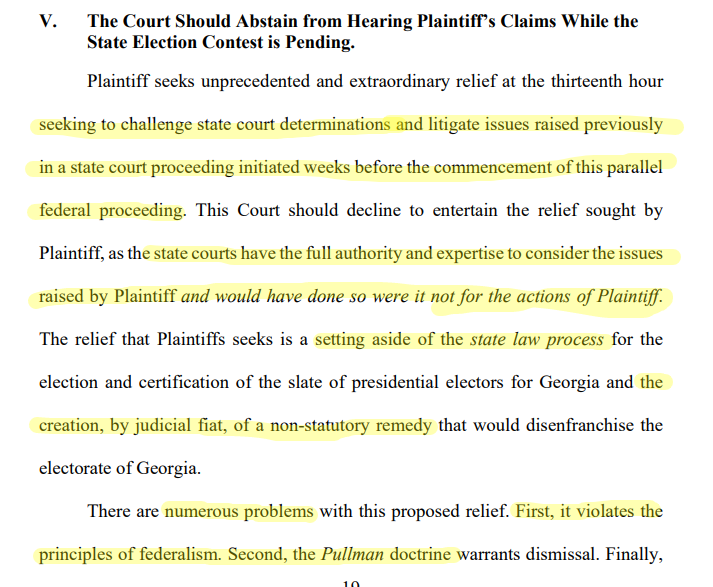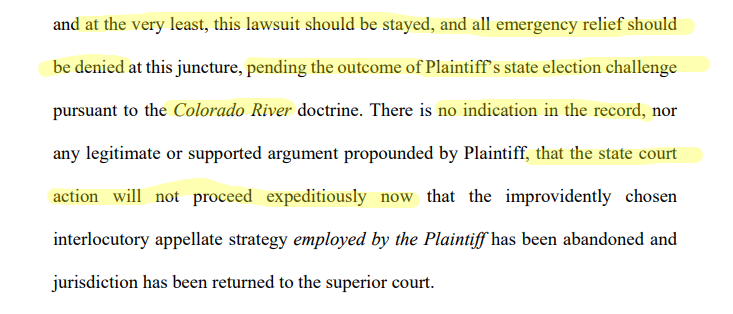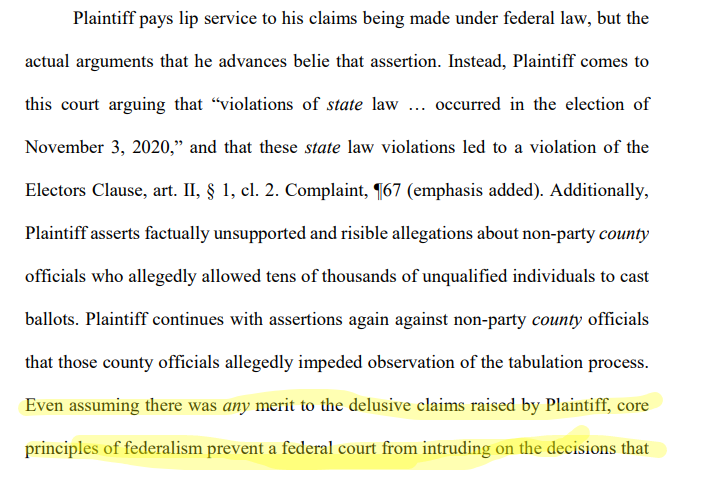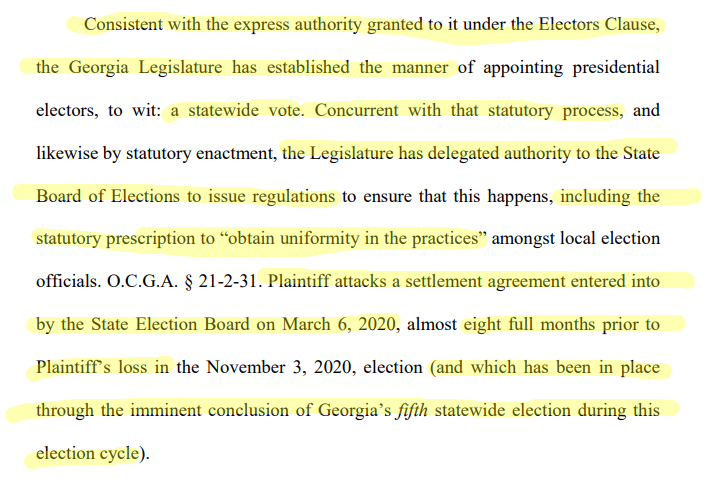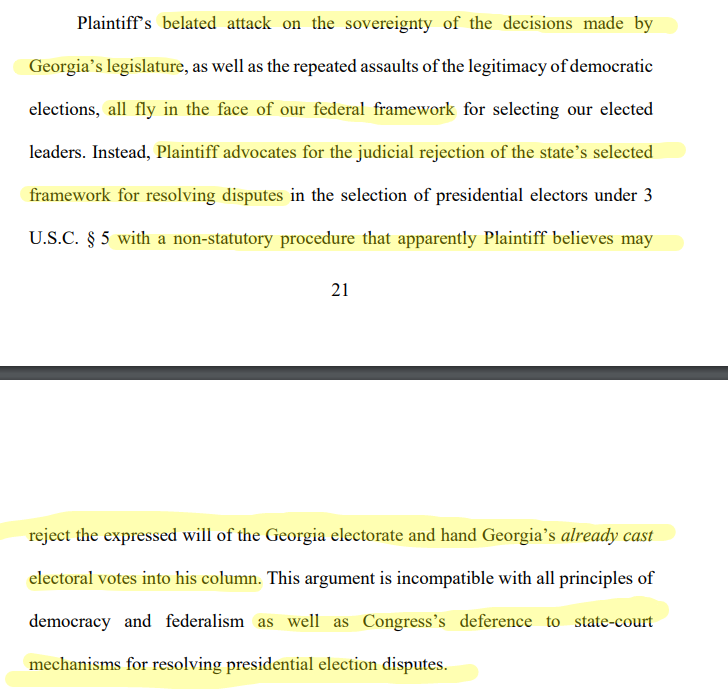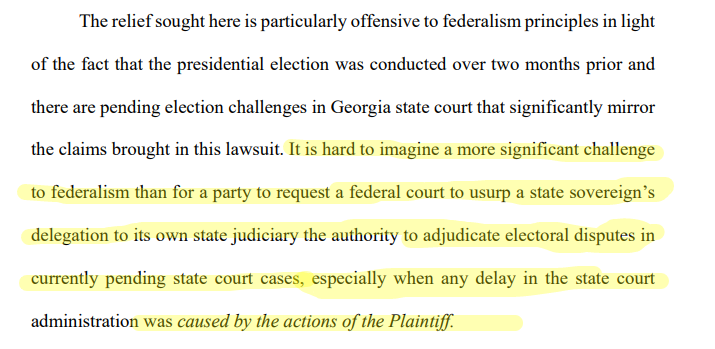Raffensperger has filed his response to the new Trump case, on very short notice. @questauthority is livereading it here https://www.twitch.tv/questauthority
So I'll do a twitter thread
So I'll do a twitter thread
Let's start with the Table of Contents, which tells you which points they're going to hit. It's all the ones you would expect: the 5 reasons the court shouldn't bother hearing the case at all (standing, mootness, laches, sovereign immunity, abstention) plus losing anyway
This is a nice start to the intro. We counted this stuff over and over. We've already certified repeatedly, appointed electors, sent in the slate, they voted already.
We. Are. Done. This is in Congress's hands now. So what are they doing in your court suing us??
We. Are. Done. This is in Congress's hands now. So what are they doing in your court suing us??
This is a good follow-up. Not only is it over, but they've tried to challenge all these things and lost over and over and over.
Trial on January 8 doesn't seem like a smart thing to rely on, though, given that the count in Congress is on 1/6
Trial on January 8 doesn't seem like a smart thing to rely on, though, given that the count in Congress is on 1/6
Also, Mike, come try to heckle. Just you try it
Then we get to the factual background. Won't torture you with all of it.
But this is a weird thing to show up in a statement of facts. Also, I question its accuracy.
But this is a weird thing to show up in a statement of facts. Also, I question its accuracy.
Georgia law provides for post-certification election challenges, which would be useless if the certification is irreversible. Same for the governor's certification of electors, since the law allows election challenges up to 5 days post certification of the results
Or perhaps not. This is an excellent point. It basically says "if you want to challenge the election results after those deadlines you can ask the court to STAY the certifications by showing a good reason for concern."
On the other hand, if that happens the deadline for the challenge is "five days after certification, which won't happen til after the challenge" which seems ... unworkable? So ... I don't know. Will be an interesting argument, and I see viable arguments either way
But yes, "Trump is responsible for the entire delay" is going to be a theme for this response, I'm guessing
So here's a nice paragraph walking the judge through the dick-and-foot-shooting procedural moves we discussed in the thread on Trump's filing; yeah, what we figured out from the Trump filing is exactly what happened: the idiots filed a notice of appeal that delayed the state case
Oh, lol
After being tapped on the head by the judge with "hey, idiots, if you wanted me to do anything you need to withdraw the notice of appeal" they wasted another day before doing it, at which point the state court kicked into gear
So, just to recap. Their ENTIRE theory of "the state court is treating us unfairly" is "they took too long to give us the ALJ we asked for". GA has just neatly pointed out that ALL of that delay - literally every second of it - was because of the Trump team.
Seriously. They filed 12/4, but got bounced for not paying their filing fee. They only really filed 12/7 (and btw, telling the federal judge that you filed 12/4 and the court delayed until 12/9, without mentioning that you screwed up the filing and didn't get on file for 3 days?)
They then waited another 3 days to ask the Court to do anything, and right when the Court did - in one fucking day, which is a land-speed record for state courts, in my experience - they filed a notice of appeal that stopped the court from doing anything else.
And then LEFT THAT IN PLACE WITHOUT DOING ANYTHING for weeks until the court said "uh, hey, guys, if you want us to act ..."
They then waited ANOTHER day to withdraw it, and the Court again IMMEDIATELY started giving them what they asked for.
They then waited ANOTHER day to withdraw it, and the Court again IMMEDIATELY started giving them what they asked for.
The VERY NEXT DAY they filed this case in Federal Court arguing that the state had deprived them of due process by not handling their case quickly enough.
Good God.
Good God.
"Your honor, we stopped the court from acting quickly enough, so that's a due process violation" is ... um ... *an* argument, I guess?
Speaking of which, Raffensperger is on to the argument.
Oh! Meant to mention one screenshot back: typing "trail" when you meant to say "trial" is the type of thing that will happen when you're given less than 12 hours notice to file a brief like this.
Oh! Meant to mention one screenshot back: typing "trail" when you meant to say "trial" is the type of thing that will happen when you're given less than 12 hours notice to file a brief like this.
Given the time constraints, this brief is particularly impressive work, even with them able to crib substantive bits and pieces of it from other filings
"The Eleventh Circuit - you know, the guys who will review any ruling you make and whose precedent you are absolutely REQUIRED to follow - just held you can't consider cases like this" is a particularly strong start to any argument section
On to the nuts and bolts of the standing argument:
1) You're suing the wrong people, or
1) You're suing the wrong people, or
I will say that it's kind of weird that the intro focused on traceability ("who hurt you?"), then the next point was "you're not the legislature" and now we're back to "who hurt you" on the due process claim - but those are the types of structural issues deadlines can cause
That said, I don't find this to be a particularly strong argument; county officials may have validated the votes in question but the Secretary of State did a risk-limiting audit of the count after the fact and before certifying.
Then again, the Eleventh Circuit seems to have liked this argument, in which case I'm dead wrong (though there was no audit for the Senate races, so ... maybe?). BRB, gonna go read that opinion
OK, after looking at it, I don't think this case controls. The issue there was a challenge to signature matching on absentee ballots, which by statute is done only by the county officials. This is a challenge to whether the election was certifiable as a whole, which seems to be
squarely within the Secretary's authority. Unlike the Perdue case, Trump isn't asking that anyone be directed to re-check signatures (which would be county officials). He's asking for the *Secretary's* signature to be rescinded.
It's not a slam dunk either way but I wouldn't be surprised if the judge isn't persuaded by this standing argument
This, on the other hand, is self-evidently true. Neither the *Secretary of State* nor the *Governor* had anything at all to do with the court delays - which were all caused by Trump's own lawyers. And it's not like they can order the state court to move faster
That said, the primary point of that argument by Trump is to give the court reason to say "I'll take this on even though it's already in front of another court, because that court is screwing you with delay"
It won't work, for multiple reasons. But that isn't a standing issue
It won't work, for multiple reasons. But that isn't a standing issue
(BTW, I expect we'll see this issue addressed more directly in the abstention section, so we'll get there, but briefly, the path to review of state court delay is in state court, not federal court)
This is a strong argument. Not only has the Eleventh Circuit already held that you can't turn back time, you can't find a way, but also there's a Bush v. Gore problem: State law provides for certification and voting deadlines and a way to delay it, and no way to "decertify"
It's not for Federal courts to invent new ways to vindicate supposed state election rights; the legislature provided a path for election challenges, and this is very very much "you snooze, you lose" - especially given all the laches issues we're about to get to.
After all, if you could have challenged the signature match settlement, and the mailing of ballots and applications, among other things, well before the certification deadlines, why should the court invent a new form of relief ("decertification") just because you delayed?
Here's that laches argument, and it's very well done. Clear and - with respect to the "this was happening months ago" stuff - very very hard to argue against.
This is also very nice, but ideally I'd like to see some sort of citation for the claim that Trump knew about the supposedly illegal votes "shortly after the election"
Also, the continued shots at the incompetence of Trump's lawyers really soothes the soul. Fucking up basic emergency filing procedures in, well, an emergency, is pretty terrible.
Also, I'm guessing that last highlight previews what we'll see in the "balance of the harms" section
Also, I'm guessing that last highlight previews what we'll see in the "balance of the harms" section
Next we have the Sovereign Immunity stuff we've seen before and that the plaintiffs just decided to ignore. You CANNOT sue a state in federal court, arguing that it did something that harmed you in the past and you want that harm fixed
There are exceptions to that, like when the State says "you can sue us for this" or when Congress says "yeah, you can sue them for this", or when you're asking the state to "please stop violating my rights". But not "fix the past violation"
For example (and ignoring any waiver issues), take a state that is refusing to let a Muslim prisoner pray or provide a Jewish prisoner kosher food. They can raise first amendment claims in federal court asking for an order telling the State "stop it. Let him pray/eat"
But if not for Congress passing a civil rights law that expressly allowed for suing states over those violations, they wouldn't have been able to get damages for past violations
Here, Trump isn't asking to remedy an ongoing "violation" of his rights. He's asking the Court to fix what he claims was a *past* violation. That's not going to fly in Federal court
OK, I'm actually exhausted so I'll stop here, and we can cover abstention and the merits of the request for injunctive relief after I get some sleep.
Night, all
Night, all
Good morning. Let's talk abstention. Reminder, abstention is the doctrine that lets Federal courts say
So, here's the core of Georgia's abstention argument: Federalism (some things are state issues, some are federal, and this is a state issue), Pullman abstention (state courts, not federal courts, get first crack at whether state law is constitutional), and
Colorado River abstention (federal courts shouldn't step in where there's parallel litigation in the state courts on the same issues)
They start with Federalism, which is a HUGE issue in all of these cases. The Constitution says STATES get to appoint electors in the manner STATE LEGISLATURES choose.
This is a core state power, even if it's one with national impact, and the Federal government should have very very little to say about it. It's fair to have a constitutional overlay of federal principles states need to be bound by - like who gets the vote if there's a vote, or
nondiscrimination, etc. It's a spectrum. But when you're getting into fine-grained parsing of whether state law was actually followed in a particular election, you are (IMHO) firmly in the "this is a State issue the federal gov't should stay out of" end of the spectrum
This is really well done. Not only does it highlight the distinction between "Manner" of choosing electors ("statewide election") and the particular processes used to implement the manner, but it emphasizes that the legislature delegated that authority by statute
So even if there was any argument that the "Manner" authorized by the constitution includes "specific election regulations", the Legislature handed that role over to the State Election Board, which it can do. Plus ordered the Board to "obtain uniformity" which is what the
Settlement Agreement Trump keeps whining about (but didn't challenge until he lost) does.
That's a LOT of punch for a short paragraph
That's a LOT of punch for a short paragraph
Same here. This isn't just a general federalism issue. Congress, in the Electoral Count Act, announced (and put into play) a deliberate policy of deferring to state-law processes for resolving election challenges. Trump is asking the Court to disregard that.

 Read on Twitter
Read on Twitter